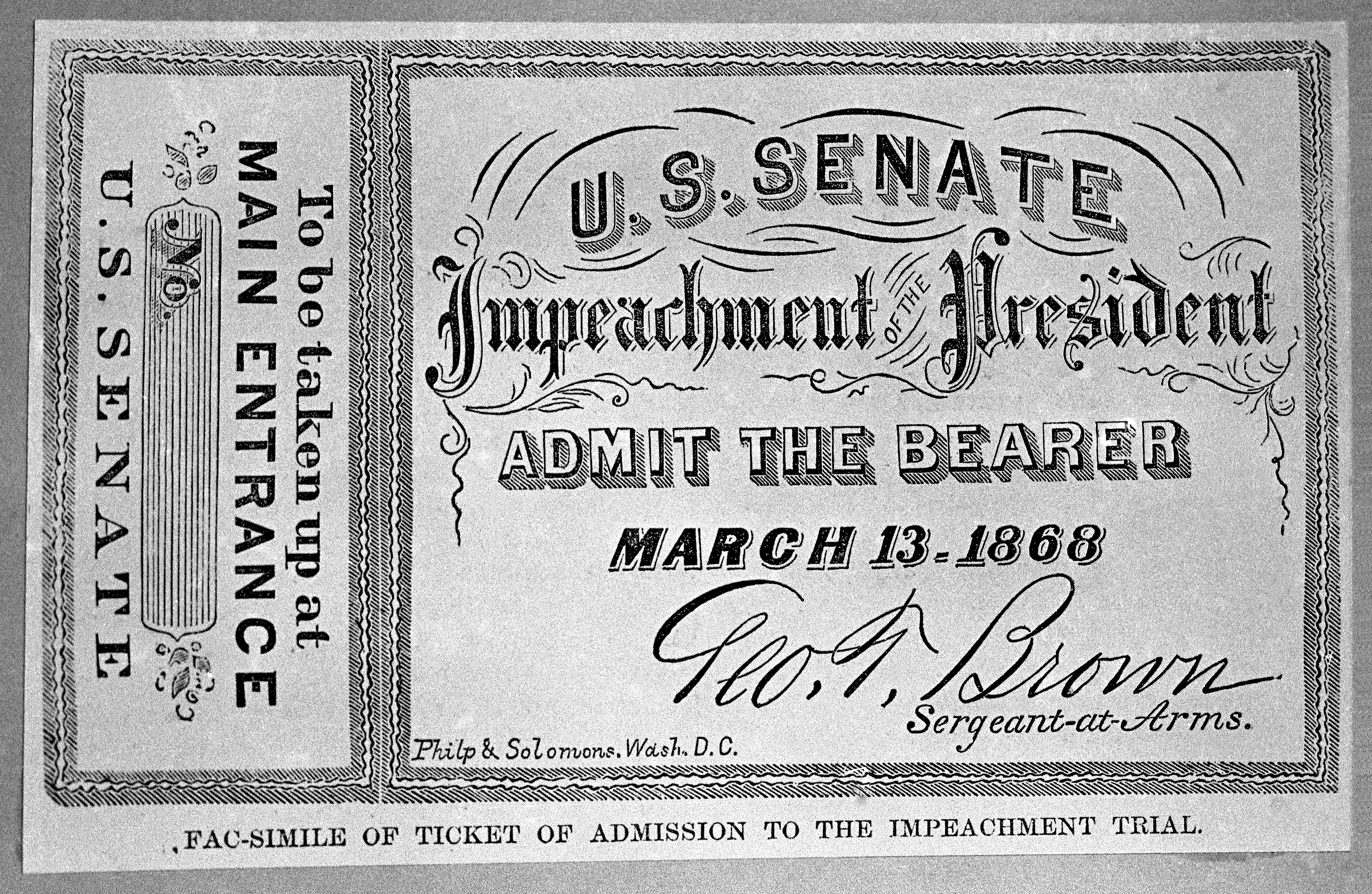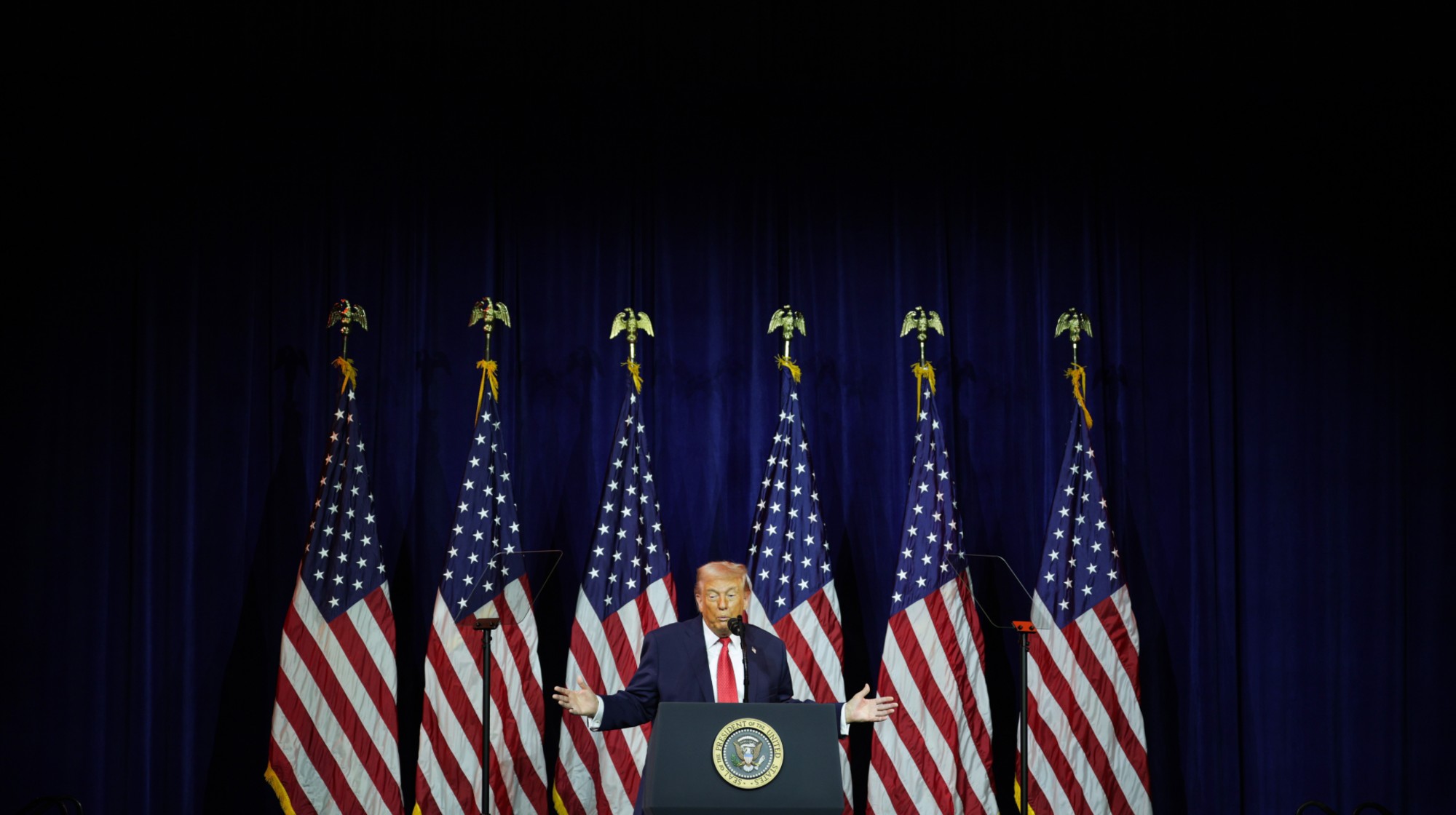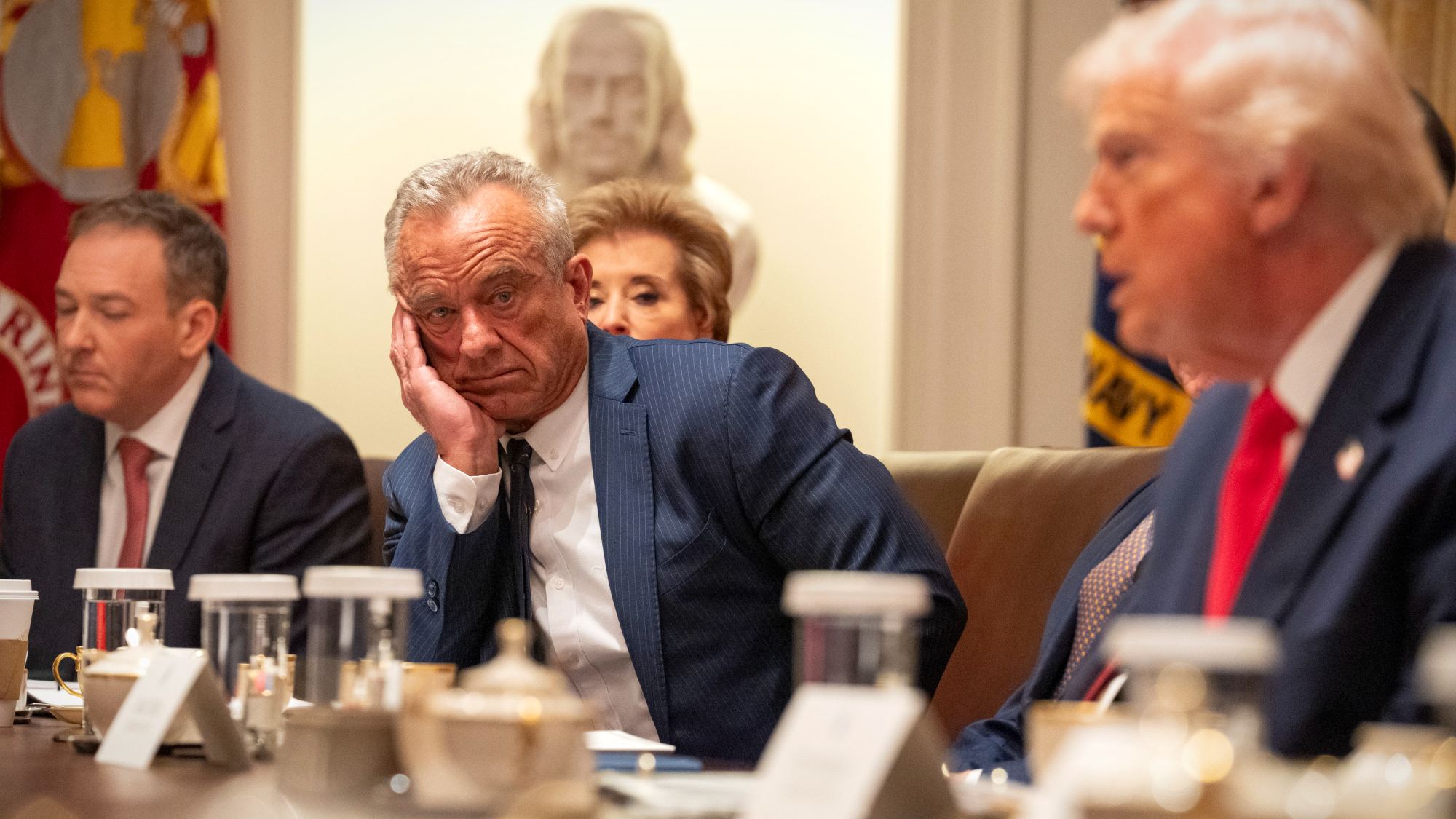The impeachment of Andrew Johnson
Johnson's Republican adversaries in Congress accused him of defying the law, acting like a king, and speaking and acting in a way that was unbecoming of the presidency

A free daily email with the biggest news stories of the day – and the best features from TheWeek.com
You are now subscribed
Your newsletter sign-up was successful
The 17th president defied Congress, personally insulted rivals, and accused them of staging a coup. Here's everything you need to know:
Why was Johnson impeached?
His Republican adversaries in Congress accused him of defying the law, acting like a king, and speaking and acting in a way that was unbecoming of the presidency. America's 17th president took office upon the assassination of Abraham Lincoln, amid a polarizing struggle in Washington over the Reconstruction of the South after the Civil War. Johnson was an outspoken, temperamental populist given to fiery speeches laden with insults, blatant racism, and suggestions that his political enemies be hanged. A semiliterate tailor with no formal education, Johnson rose to political power by aligning himself in his home state of Tennessee with a loyal base of poor mountaineers and small farmers seeking a political champion. He was hated by that era's "Radical Republicans" for his adamant opposition to their attempt to impose racial equality and the rule of law on the defeated Confederacy. Rather than root out the institutional white supremacy that had fueled the Civil War, Johnson thwarted attempts to bring freed slaves equal protection under the law. "Everyone would and must admit that the white race is superior to the black," Johnson said.
The Week
Escape your echo chamber. Get the facts behind the news, plus analysis from multiple perspectives.

Sign up for The Week's Free Newsletters
From our morning news briefing to a weekly Good News Newsletter, get the best of The Week delivered directly to your inbox.
From our morning news briefing to a weekly Good News Newsletter, get the best of The Week delivered directly to your inbox.
How did he become president?
In 1861, Johnson demonstrated a stunning moment of political courage when he became the only senator from a Confederate state to remain loyal to the Union. "Damn the negroes, I am fighting those traitorous aristocrats, their masters," he said. (He owned a few slaves himself.) In an attempt to forge some national unity, President Lincoln, a Republican, appointed Johnson, a pro-Union Democrat, military governor of Tennessee in May 1862. Two years later — with the Civil War still 10 months from conclusion — Lincoln added Johnson to his Republican re-election ticket. But Johnson's start on the national stage was inauspicious. Fighting off a bout of typhoid fever on Inauguration Day, he reinforced himself with three tumblers of whiskey and was visibly drunk when he belligerently called out Cabinet members by name, reminding them that their power derived from the people. His predecessor as vice president, Hannibal Hamlin, yanked on Johnson's coat in a futile effort to stop his jaw-dropping, 17-minute-long diatribe. Forty-two days later, Lincoln was assassinated, and Johnson succeeded him.
How did Johnson respond?
He abandoned Lincoln's agenda. Once elevated, Johnson declared that America "is a country for white men" and guaranteed it would remain as such for "as long as I am president." In a meeting with black abolitionist Frederick Douglass at the White House, he suggested deporting millions of black freedmen. He also flouted Congress by pardoning more than 7,000 Confederates, restoring their property (aside from slaves), and authorizing former rebel states to hold constitutional conventions attended only by white delegates. He accused Radical Republicans of plotting a coup. As he lashed out at critics, opposition to "King Andy," as he was branded, began to crystallize in Congress.
A free daily email with the biggest news stories of the day – and the best features from TheWeek.com
What did Congress do?
Some members searched for evidence connecting Johnson with Lincoln's assassin, John Wilkes Booth. The House investigated Johnson's drinking and whether he frequented prostitutes. In March 1866, Johnson vetoed a civil rights bill that would have granted freedmen citizenship and the right to sue and own land. Both houses of Congress overrode the presidential veto — the first time that ever happened on major legislation.
What happened during his term?
Through the fall of 1866, Johnson toured northern cities to build support for his lenient approach to Reconstruction, casting himself as the only thing standing between whites and "negro domination." He compared himself to Jesus Christ and his pardons for Confederates to divine mercy. When a heckler in Cleveland yelled, "Hang Jeff Davis!" Johnson suggested that his chief political antagonist, Rep. Thaddeus Stevens (R-Pa.), should be hanged instead. An aide begged him to consider the dignity of his office, to which Johnson replied, "I don't care about my dignity." Henry Raymond, publisher of The New York Times, asked, "Was there ever such a madman in so high a place as Johnson?"
What brought on impeachment?
During the tour, Johnson threatened to fire any Cabinet member who opposed him, prompting Congress to pass the Tenure of Office Act prohibiting such dismissals without Senate consent. Matters came to a head in early 1868 when Johnson fired Secretary of War Edwin Stanton, who transferred his belongings to the War Department, barricaded the doors, and refused to leave the building. The House voted 126 to 47 to impeach Johnson on 11 articles. The first eight concerned Stanton's ouster; the ninth Johnson's circumventing of the chain of command by giving orders directly to a general; and the 10th and 11th his conduct and rhetoric in office, saying he had attempted to bring "disgrace, ridicule, hatred, contempt, and reproach" on Congress. The Senate trial began in March 1868 and was the hottest ticket in Washington for a month. In the end, with Walt Whitman watching from the gallery, the Senate fell short of the two-thirds majority needed to remove Johnson by a single vote — that of Sen. Edmund Ross (R-Kan.), who may have been bribed. Johnson completed his term but had little support or authority, and neither party nominated him for re-election.
Congress' struggle to impeach
Then — as is the case today — Congress labored mightily over what constituted an impeachable offense. Should the process be understood narrowly as a criminal proceeding that addressed the breaking of a specific law or, more broadly, as a political mechanism to redress what members saw as Johnson's unfitness for office? Although Johnson's racist rhetoric was not illegal, Sen. Charles Sumner (R-Mass.) framed impeachment as a final battle against slavery. "Driven from these legislative chambers, driven from the field of war, this monstrous power has found refuge in the Executive Mansion," he said. Rep. Thaddeus Stevens called impeachment a "purely political proceeding" that is "intended as a remedy for malfeasance in office and to prevent continuance thereof." In the end, Congress relied primarily on what historian Brenda Wineapple has called "merely a legal pretext" — Johnson's violation of the Tenure of Office Act.
-
 6 exquisite homes with vast acreage
6 exquisite homes with vast acreageFeature Featuring an off-the-grid contemporary home in New Mexico and lakefront farmhouse in Massachusetts
-
 Film reviews: ‘Wuthering Heights,’ ‘Good Luck, Have Fun, Don’t Die,’ and ‘Sirat’
Film reviews: ‘Wuthering Heights,’ ‘Good Luck, Have Fun, Don’t Die,’ and ‘Sirat’Feature An inconvenient love torments a would-be couple, a gonzo time traveler seeks to save humanity from AI, and a father’s desperate search goes deeply sideways
-
 Political cartoons for February 16
Political cartoons for February 16Cartoons Monday’s political cartoons include President's Day, a valentine from the Epstein files, and more
-
 Democrats pledge Noem impeachment if not fired
Democrats pledge Noem impeachment if not firedSpeed Read Trump is publicly defending the Homeland Security secretary
-
 The billionaires’ wealth tax: a catastrophe for California?
The billionaires’ wealth tax: a catastrophe for California?Talking Point Peter Thiel and Larry Page preparing to change state residency
-
 Trump fears impeachment if GOP loses midterms
Trump fears impeachment if GOP loses midtermsSpeed Read ‘You got to win the midterms,’ the president said
-
 Bari Weiss’ ‘60 Minutes’ scandal is about more than one report
Bari Weiss’ ‘60 Minutes’ scandal is about more than one reportIN THE SPOTLIGHT By blocking an approved segment on a controversial prison holding US deportees in El Salvador, the editor-in-chief of CBS News has become the main story
-
 Democrat files to impeach RFK Jr.
Democrat files to impeach RFK Jr.Speed Read Rep. Haley Stevens filed articles of impeachment against Health and Human Services Secretary Robert F. Kennedy Jr.
-
 Has Zohran Mamdani shown the Democrats how to win again?
Has Zohran Mamdani shown the Democrats how to win again?Today’s Big Question New York City mayoral election touted as victory for left-wing populists but moderate centrist wins elsewhere present more complex path for Democratic Party
-
 Millions turn out for anti-Trump ‘No Kings’ rallies
Millions turn out for anti-Trump ‘No Kings’ ralliesSpeed Read An estimated 7 million people participated, 2 million more than at the first ‘No Kings’ protest in June
-
 Ghislaine Maxwell: angling for a Trump pardon
Ghislaine Maxwell: angling for a Trump pardonTalking Point Convicted sex trafficker's testimony could shed new light on president's links to Jeffrey Epstein